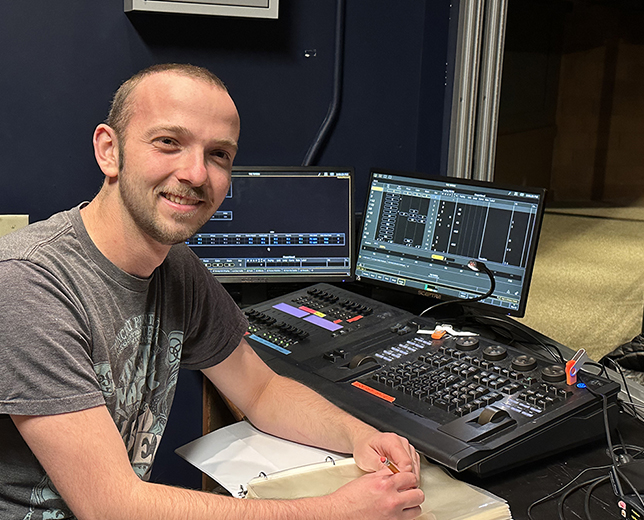Mobile Compassion Lab Brings Classroom and Workplace Support to Cultivating Compassion

How can we cultivate more compassion in our relationships? How do we communicate genuine caring to those whose experience is quite different from ours? Can we learn to practice compassion even with people we disagree with on issues that seem central to our very identities while remaining true to our values?
As we approach a presidential election within a politically polarized environment that may strain relationships, the CAHSS newsroom turned to Cris Tietsort, assistant professor of organizational communication in the College of Arts, Humanities & Social Sciences. A 4D Experience faculty research fellow, Tietsort recently launched a pilot “Mobile Compassion Lab” to help students, faculty and staff learn to practice greater compassion.
What is your role as faculty in the Communication Studies Department and how does it connect with the 4D Experience and the new Mobile Compassion Lab?
I teach and conduct research focused on strengthening interpersonal relationships, often in the context of leadership and work. My emphasis on compassion and empathy, and especially on how we gain and develop those skills, connects with the 4D goal of supporting character development.
Compassion is a core component of character and the compassion lab was initially geared toward providing an applied learning experience in 4D. The idea of a mobile classroom is to partner with faculty members to help them integrate discussions about compassion in their classrooms that include addressing big questions such as how to be compassionate with people we disagree with while maintaining our own sense of character. Long-term, I hope the compassion lab will continue to advance more research related to compassion in a variety of contexts.
In partnering with faculty, we talk about challenges such as how we can be compassionate toward students while also maintaining a sense of accountability. I’m trying to help people not only identify and understand their own values, but also equip them with the tools and skills to apply those values when they matter.
How can students, faculty and staff cultivate more compassion in our academic and work environments?
A top-level definition of compassion is responding to the pain and suffering of others. Empathy is being able to say, “I see that you’re in pain,” but compassion is the ability to recognize that others are suffering and then relate and respond in a meaningful, empathic way. It’s the action that differentiates compassion. The first aspect – recognizing another’s pain — is underappreciated but so critical. We’re all so busy today as faculty, staff and students, it’s hard to even make space to recognize others might be struggling.
I try to ask if a colleague had a nice weekend or break but follow up with “really, how was your break?” One of my friends has been researching this and found that this double questioning method can be more meaningful because often the first time we ask, “how are you?” people have a rote response. But if we pause and ask again, often people will be more authentic and maybe say, “oh, break was a little harder than I expected, things are kind of heavy right now.”
So sometimes we need to ask ourselves if we really know how the people that we care about are doing. As a faculty member, that means asking how I can create an authentic space where students can tell me how they’re doing, especially given the power differences between faculty and students. In organizations, leaders often assume that people are being open and honest about how they feel but decades of research suggests this probably is not always the case.
The second piece is how do we then relate to others? Compassion and empathy often are seen only as feelings toward others. The problem with that is people can say “I don’t really feel compassionate toward people who have different perspectives.” In these cases, I think we need to lean into “perspective getting,” or inquiring about how others feel and see the world.
A lot of the research shows that we’re not actually very good at putting ourselves in other people’s shoes, especially if we’re part of the majority group trying to put ourselves in the shoes of someone who has been traditionally marginalized. Perspective getting acknowledges that “I don’t know how you feel but I want to.” It’s about asking questions and trying to understand. If you’re talking across political divisions you can lean into a sense of curiosity and say “wow, that sounds really hard, help me understand that.”
The last piece is action — what can we do to try to alleviate another person’s suffering? A lot of times it’s just giving them a sense of validation. There is a study on Loneliness in the Workplace that came out pre-pandemic that reported about a third of the country across demographics and age groups said that if they had something serious going on in their lives, they didn’t have a single person who they felt would listen to them.
Compassion begins with authentically making space for someone to share what they’re going through and saying “wow, I’m sorry — that’s hard. I don’t have an answer but I’m here with you.” Often, we feel like we must do something but all the research on social support suggests that we overestimate how much people want us to fix their problems. And even if they do want help, they don’t want that first.
In terms of providing help as faculty, for example, I can give a student a one-day extension that allows them to deal with whatever they’re going through and to also get their work done. It’s a small thing to me (although there can be meaningful debate on this topic) that can have a huge impact on the student. Similarly, as a supervisor, you can create a little more space to delay something or ask someone else to pitch in and help.
Could you address how to offer compassion to others whose experiences are so different from ours?
Sometimes compassion takes courage. Let’s say, hypothetically, that you have a friend or colleague who is connected to the global conflict with Gaza and Israel. It can feel uncomfortable to ask how they’re doing because it feels charged or political and yet, at the same time, they may have fewer and fewer people asking them how they are doing due to feeling uncertain.
We might underestimate how effective it can be to just say “I have no idea what you might be feeling about this right now but I would like to understand.” Most of the time if you express a sincere and humble desire to understand, people tend to respond positively. You’re providing an opening for them if they want to talk but you’re also acknowledging the tension you feel and what might have been holding you back. We also need to give them permission to not have to do it then, and there.
How do we practice compassion with people who hold different political views as we navigate an already contentious presidential election year?
When it comes to relationships that matter in our lives, it is helpful to ask what’s most important in this relationship. Is it most important that they understand my political view or change their political view, or is it most important that I have a caring relationship with them? Reconnecting with what’s most important before we go into a situation like the holidays in which it’s likely that our political differences will come up can prevent us from getting triggered when differences arise. We might have a value of having close family relationships and a value of political activism and we need to decide our most important intention.
Secondly, if you do want to engage on the issues, it goes back to that idea of perspective getting. Try to be curious about why they hold the views they do. A phrase that comes from the negotiation literature is to be “hard on the issue and soft on the people.” We perceive that if we get curious about someone else’s perspective it means we’re agreeing with them but that doesn’t have to be the case. Being hard on the issue and soft on the person is saying I can engage with someone compassionately, respect them as a person, while also saying that idea doesn’t make sense and here’s why.
Finally, it’s important to know what your nonnegotiable issues are. For some people it’s “just politics” but for others, it’s not — politics affects them in tangible ways, such as agency over their own bodies or policies that impact their identity group. So, it’s important to identify the core issues that “I just don’t want to talk about” or don’t feel are up for debate, which will vary by individual. How you as a woman feel talking about abortion rights, for example, would be different for me as a man. And so, at times, boundaries can be healthy to prevent ourselves from getting drawn into arguments or behaviors that don’t really reflect our deeper character and values.
To find out more about the Mobile Compassion Lab pilot program, contact chris.tietsort@du.edu





